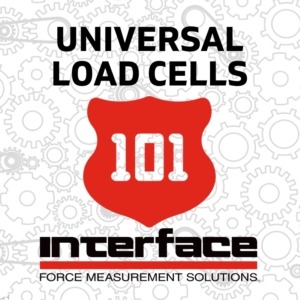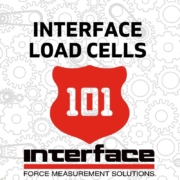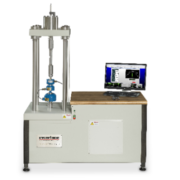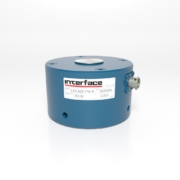Universal Load Cells 101
 In the force measurement testing world, versatility has tremendous value. That is why some of Interface’s most popular products are designed to provide adaptability for a broad spectrum of testing and force monitoring processes.
In the force measurement testing world, versatility has tremendous value. That is why some of Interface’s most popular products are designed to provide adaptability for a broad spectrum of testing and force monitoring processes.
These products are engineered for universal use cases, from standard tension and compression LowProfile Load Cells to Interface’s multi-axis sensors that can measure up to 6 axes for additional data.
Universal load cells can measure both tension and compression forces in testing and monitoring applications. Universal load cells provide the ability to capture data on both forces. They are designed for a broad scope of force or weight measurement applications such as weighing scales, material testing machines, and industrial automation equipment.
These load cells are ideal for installations where the load may change from tension to compression. Universal load cells also suit various product and material destructive testing as they are robust and easily mounted in various applications.
Top Benefits of Universal Load Cells
Range of Standard Capacities: Universal load cells are diverse in dimension and capacities. From miniatures like our model ULC, which is the world’s most accurate ultra-low capacity tension and compression load cell measuring loads from 0.1 to 2 N (10.2 grams to 500 gmf) to 1000 Series High Capacity Fatigue Rated LowProfile Load Cell capable of measuring tension and compression over a million pounds of force, Interface has a range of universal options. The requirements of any testing program will define the type of load cell.
Versatility: Universal load cells can measure force in multiple directions, including compression, tension, and shear forces.
Adaptable Accessories: Universal load cells can be used with various accessories and fixtures to suit specific applications. This includes bases, mounting hardware, adapters, cables and protective enclosures. Wireless sensor options are in high demand for universal load cells.
Engineered to Order: Interface offers engineered to order and customization of our load cells to further the application use and flexibility of use.
Products such as universal load cells appeal to highly regulated industries like aerospace, defense, automotive, and industrial automation. In controlled testing, engineers must meet stringent performance measurement standards for components, equipment, and machinery.
Another area in which universal load cells stand out is in material testing. Measuring tension and compression provides critical force data when testing a material that will be used in system that needs to be both strong and flexible for safety and quality purposes.
One of Interface’s most popular load cell model, the 1200 series, is universal. For example, Interface’s Model 1200 and 1201 Series IO-Link Universal Load Cells are pancake style load cells which are IO-Link compatible with an open standard serial communication protocol that allows for the bi-directional exchange of data from sensors and devices. We also offer a 1200 and 1201 Series 3-Wire Amplified Universal Load Cell.
Features and benefits of the 1200 and 1201 Series IO-Link Universal Load Cell include:
- Proprietary Interface strain gages
- Temperature compensated
- Eccentric load compensated
- Low deflection
- Shunt calibration
- Tension and compression
- Compact size
- 3-wire internal amp choice of 4-20 mA, ±5V, ±10V, 0-5V, 0-10V
Patient Hoyer Lift
A Hoyer lift is used to move patients. A medical equipment manufacturer would like a force system to weigh disabled patients and measure the maximum force when using the equipment. Interface’s WTS 1200 Precision LowProfile Wireless Load Cell is attached to the top of the Hoyer lift. The tension and compression force results are wirelessly transmitted to the medical personal’s computer through the WTS-BS-6 Wireless Telemetry Dongle Base Station. Interface’s wireless force system was able to measure the amount of weight a patient while also clarifying the maximum capacity the Hoyer lift can hold during use. Read more about this application here.
If you need a little more flexibility in your testing and monitoring system, Interface universal load cells may be a great option for you. The choice of a specific load cell will depend on factors such as the required load capacity, accuracy, environmental conditions, and signal compatibility with the rest of the measurement or control system.
Request a Quote from Interface, The World Leader in Force Measurement Solutions
ADDITIONAL RESOURCES
Wireless Telemetry Systems 101
ITCA Tension and Compression Load Cell








